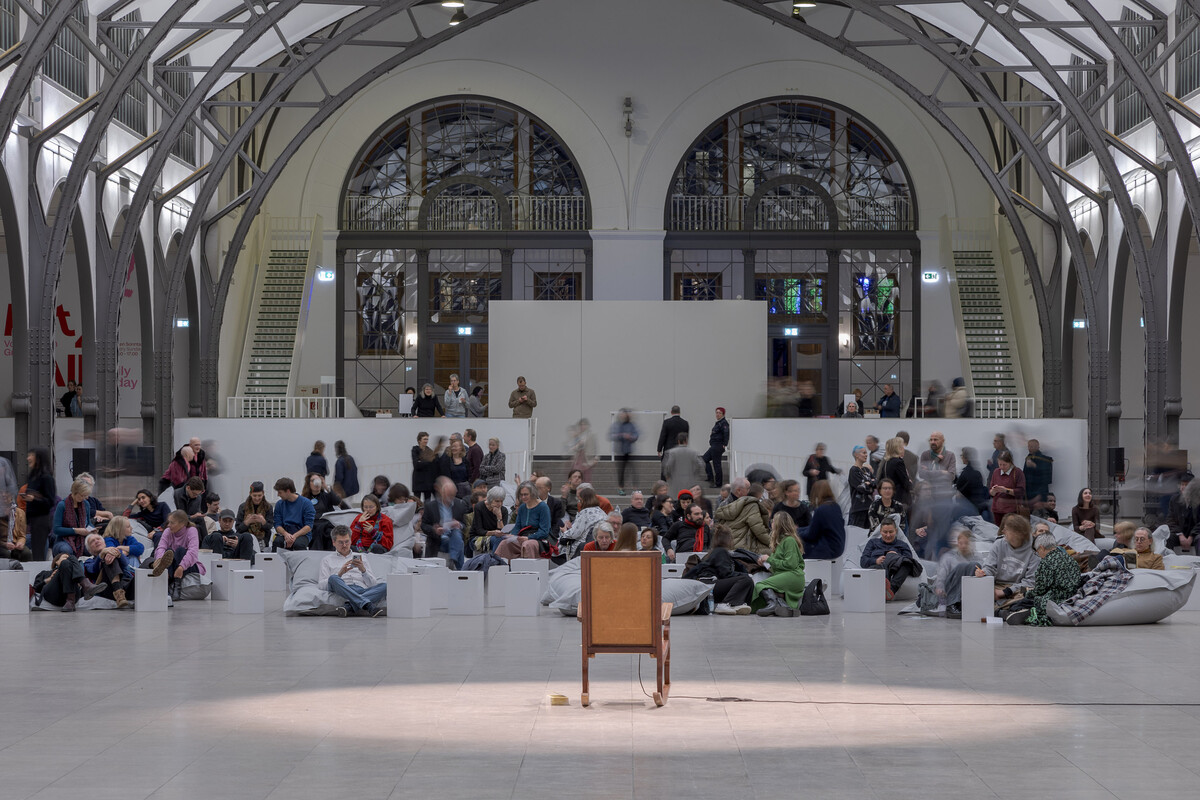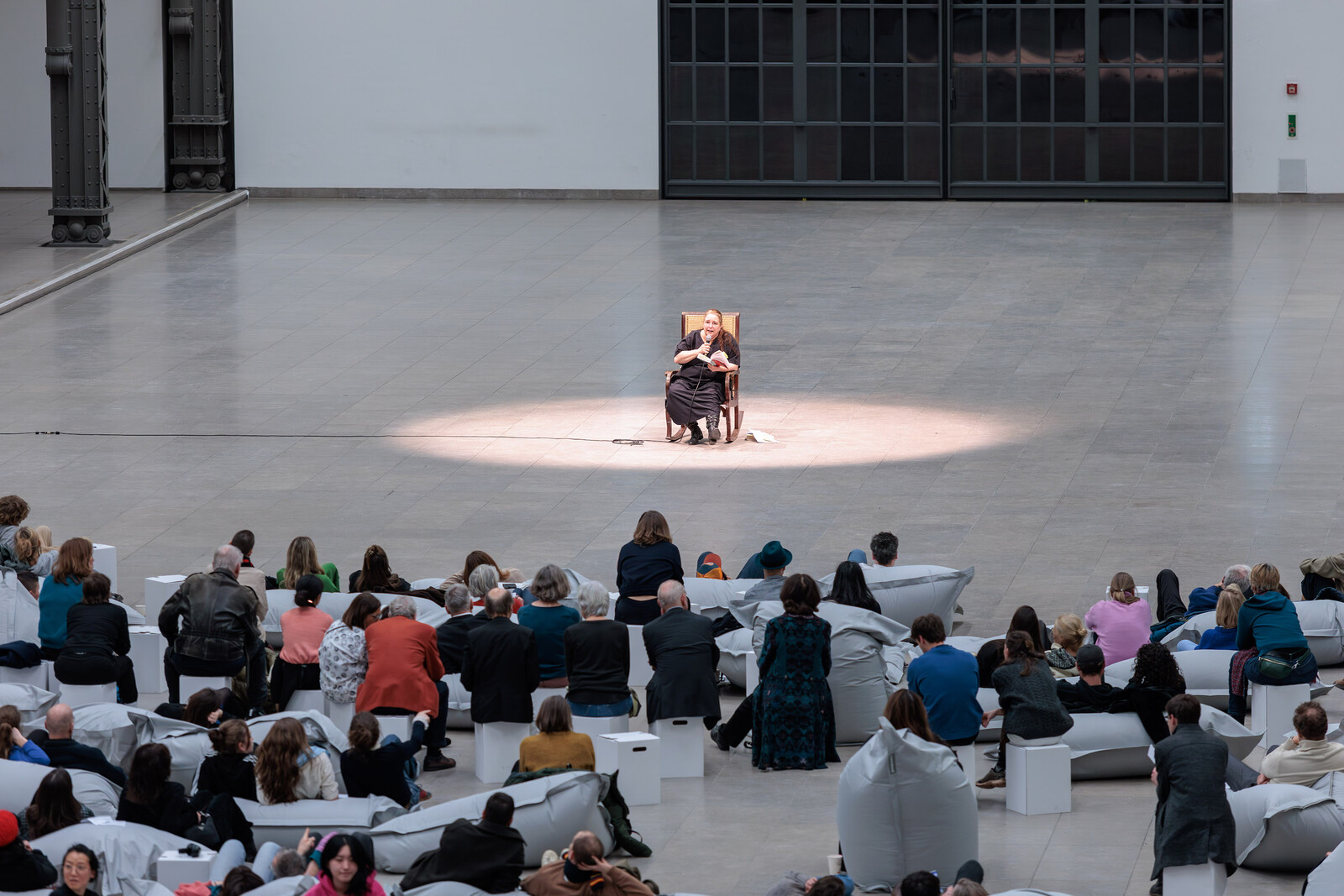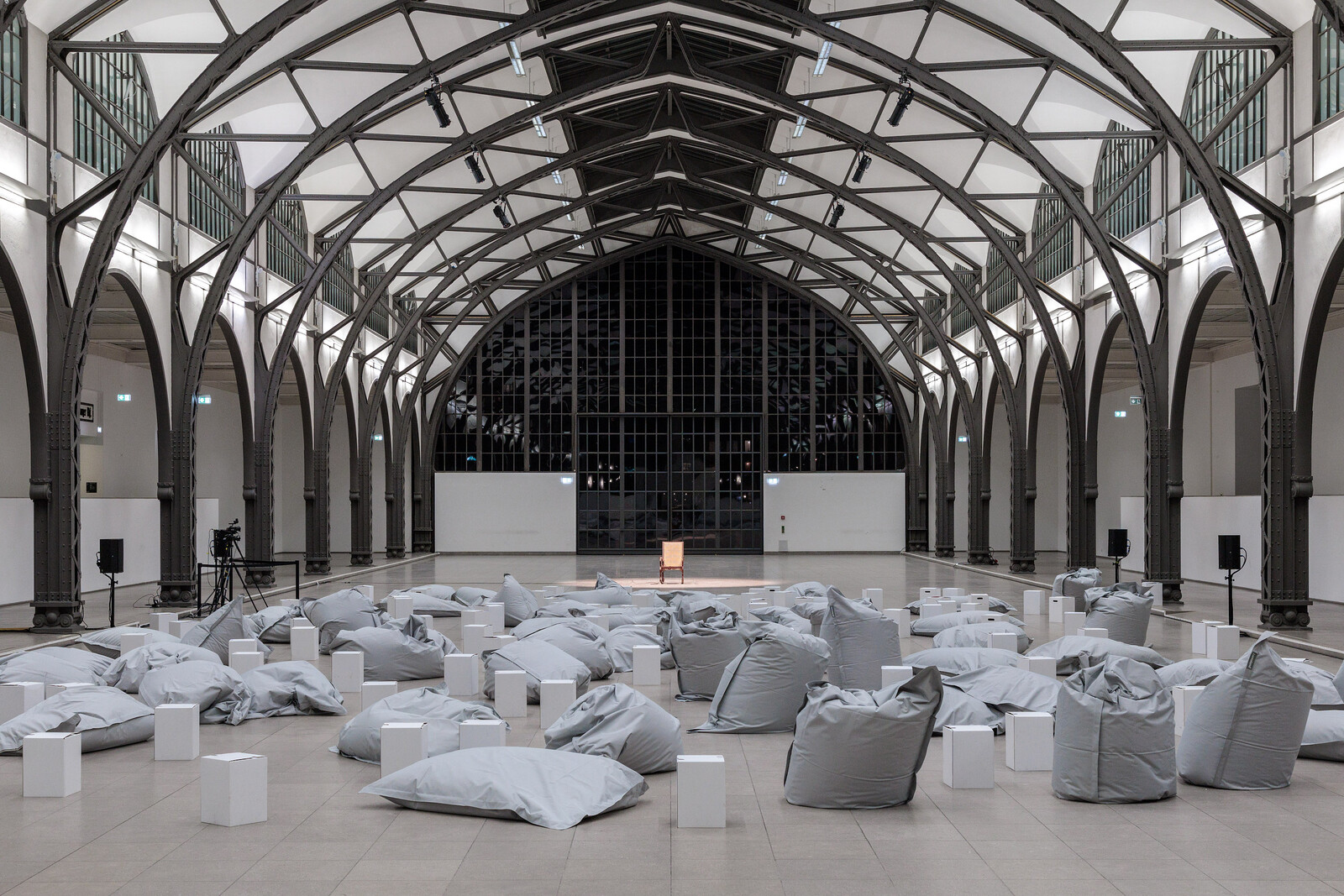In Germany’s increasingly censorious intellectual climate, Berlin’s Hamburger Bahnhof staged the Cuban artist Tania Bruguera’s “Where Your Ideas Become Civic Actions (100 Hours Reading The Origins of Totalitarianism)” inside its main hall. This participatory public reading of—and discussion around—Hannah Arendt’s The Origins of Totalitarianism (1951) was spread across four days, featuring the artist alongside writers such as Masha Gessen and Deborah Feldman, prominent artists in Berlin including Candice Breitz, and people from “the museum’s neighborhood.”
Speakers—mostly solo, sometimes in a trio, and even as a chorus—addressed the audience amid a spare scenography: a single rattan-upholstered rocking chair, illuminated from above by a beam of golden light. Hospital-gray bean bags and cardboard stools were strewn before it, stretching out towards the entrance of the museum and luring visitors into a collectivized consideration of “power and violence, plurality and morality, politics and truth.”
Microphones were connected to a sound system scattered haphazardly around the space, and synchronized with speakers outside the institution facing Invalidenstraße, a thoroughfare leading to Berlin’s central station, a few hundred meters away. Like the work’s title, Bruguera’s sonic gesture felt prescriptive—as if it were the artist’s duty to break Arendt out of the institution and onto the streets. If it succeeded in enticing passersby inside, the sparseness of the hall created an echo that made it difficult to hear those speaking clearly. Feldman remarked that the acoustics functioned as an apposite metaphor for the way in which Jews critical of the state of Israel are treated in Germany’s public fora; invited inside, but heard only in fragments.
Underpinning Bruguera’s work is the idea that discussing Arendt inside a museum can offer an acceptable framework for living together, in a time where the division between those who denounce and those who defend Israel’s onslaught on Gaza is so stark. That The Origins of Totalitarianism was made the locus of this event without any broader contextualizing of Arendt’s politics—most notably her critique of Israel’s treatment of the Palestinians as a second-class citizenry, and her observation of the symmetries between Zionism and colonial Europe—made the event seem more performative than a serious consideration of the work in light of present historical circumstances. While certain readers attempted to bring such considerations to the fore, their polite and well-mannered speech, as well as the audience’s genteel and receptive disposition, made clear the separation of injustice—as a discursive inquiry—from its human and emotive dimensions.
On the event’s penultimate day, two incidents destabilized this sterile atmosphere. The first was a reading staged by a group of anti-colonial activists—coordinated with Bruguera—who read aloud statements demanding public solidarity with Palestine, Sudan, Kurdistan, and Western Sahara. The second incident involved some of these activists returning later that day, without prior notice, to oppose Bruguera’s platforming of Mirjam Wenzel, Director of Frankfurt’s Jewish Museum, who has spoken in support of Zionism and against the framing of Israel as a colonial project.1 Their impromptu chants for the liberation of Palestine echoed throughout the hall, and were met with marked hostility by the artist and members of the public, who berated them for their spontaneity.In Crowds and Power (1960), Elias Canetti formulated how a revolutionary, leftist crowd “erupts” to “reverse” the intolerability of their immediate conditions. By this logic, these activists injected the event with a material politics, raising the stakes to bring back into focus certain anti-imperialist qualities of Arendt’s world-view, and the urgency of transnational solidarity. The expectation that dissident voices should wait their turn to speak strips them of the power that transforms socially engaged politics into “a civic action.”
Following the activists’ protest, a police report was filed by the institution, and Bruguera announced the early closure of the work through a press release jointly shared on Instagram by herself, the museum, and its two directors, stating that “hate speech” had been used by the activists and that “open dialogue” was “no longer possible.” It is unclear what specific language was deemed to be “hate speech”—the thrust of the activists’ calls were to liberate Palestinians—but it can be presumed that it was their equation of Zionism with fascism, which, within Germany’s Erinnerungskultur, registers as inherently antisemitic.2
On what would have been the final day of the reading, Bruguera removed the work’s seating arrangement but left the rocking chair in public view, alone and spotlit at the far end of the hall. Her symbolism seemed to suggest that civic exchange had become impossible, but as the chair sat so still and solitary, guarded by security, it mapped itself onto a different set of relations. It became an omen and a promise: that activists will continue to contest the illegitimacy of institutional silencing, reminding Germany that its doctrinal support for the state of Israel in light of the unfolding crisis—under the auspices of its Staatsräson—constitutes an abrogation of moral responsibility.
See “Solidarität mit Israel – Kippt die Stimmung?” SWR2 (November 10, 2023), https://www.swr.de/swr2/leben-und-gesellschaft/solidaritaet-mit-israel-kippt-die-stimmung-swr2-forum-2023-11-14-100.html (36’43”) and “Zionismus ist kein heikles Thema,” Deutschlandfunk (June 17, 2019), https://www.deutschlandfunk.de/juedische-museen-zionismus-ist-kein-heikles-thema-100.html (3’10”).
See Joseph Cronin, “Germany’s Holocaust Memory Problems,” Georgetown Journal of International Affairs (April 20, 2022): https://gjia.georgetown.edu/2022/04/20/germanys-holocaust-memory-problems%EF%BF%BC/.



